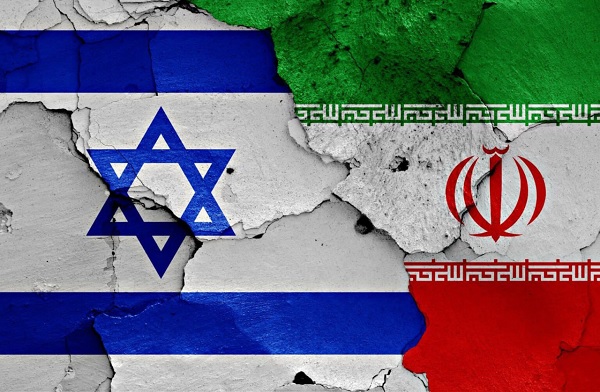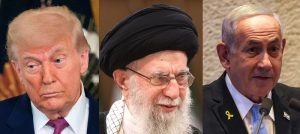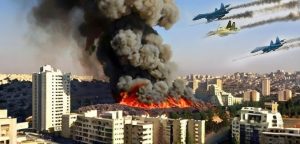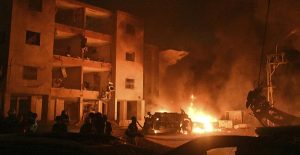
On June 13, 2025, Israel launched Operation Rising Lion against Iran, marking a dramatic escalation in long-standing regional tensions.
According to Israeli military spokesperson Brig. Gen. Effie Deffrin in a CNN interview, the operation deployed 200 fighter jets targeting Iranian nuclear facilities, ballistic missile sites, and senior military and scientific personnel. Israeli Prime Minister Benjamin Netanyahu justified the strikes, stating Iran’s nuclear ambitions posed a direct threat to Israel’s survival and that military operations would continue until this threat was neutralized. Iran denounced the attack as an act of aggression, with President Masoud Pezeshikian vowing that Tehran would defend itself and ensure Israel faced severe consequences. Supreme Leader Ayatollah Ali Khamenei echoed this, warning of a decisive Iranian response.
The Conflict at a glance
The Israeli strikes targeted Iran’s nuclear enrichment facilities in Natanz and key ballistic missile sites. Media reports indicate that the attack killed nine senior nuclear scientists and over ten high-ranking military officials, including Islamic Revolutionary Guard Corps (IRGC) Air Force Commander Amir Ali Hajizadeh. The Israel Defense Forces (IDF) confirmed the deaths of the IRGC Air Chief and other senior leaders. Iranian state media condemned the strikes as a violation of international law, accusing Israel of escalating the conflict beyond diplomatic resolution. Iran’s Foreign Minister called for an urgent UN Security Council meeting, arguing that Israel’s actions threatened regional stability. UN Secretary-General António Guterres urged both nations to exercise restraint, warning that continued hostilities could destabilize the Middle East and undermine global security.
Israel’s rationale for the strikes centered on Iran’s nuclear program, which Netanyahu and other officials described as an existential threat. On June 12, 2025, the International Atomic Energy Agency (IAEA) declared that Iran had breached its non-proliferation obligations for the first time in nearly two decades, a finding Israel and the United States cited to justify the attack. Iran maintained that its nuclear program was solely for peaceful purposes, rejecting the IAEA’s conclusions and accusing Western powers of manipulating global institutions to undermine Tehran’s strategic position, according to media reports.
Iran’s Retaliation
In response to the Israeli strikes, President Pezeshikian called for national unity and trust in Iran’s leadership. Iran launched Operation True Promise III, deploying 100 drones targeting Israeli military sites. Israel’s Defense Minister reported that most drones were intercepted by the Iron Dome missile defense system, though some strategic locations were hit. Iran followed with ballistic missile strikes on Israeli airports, with media reports indicating at least 18 deaths and over 400 injuries. Reuters reported that in a subsequent operation dubbed “The New Method,” Iran conducted a missile strike on Israel, killing five people and injuring over 100.
Israel responded with a second wave of airstrikes, deploying over 500 drones and warplanes targeting Iranian nuclear facilities, military personnel, and civilian areas, according to IDF sources. While Iranian casualty figures remain unconfirmed, reports suggest significant loss of life and extensive infrastructure damage, with Iranian officials noting mass displacement and destruction in civilian centers. In a Fox News interview, Netanyahu announced that the IDF had eliminated two senior IRGC officials in Tehran: Intelligence Chief Brigadier General Mohammad Kazemi and his deputy, General Hassan Mohaqiq. Iran condemned these targeted killings as violations of international norms, with military officials pledging further retaliation and expanded countermeasures.
-Historical Context

Historically, Iran and Israel enjoyed diplomatic and sociocultural ties, with Iran among the first nations to recognize Israel’s sovereignty, unlike many Gulf Arab states. The two cooperated on security and trade, even discussing a pipeline for Iranian oil exports. Relations deteriorated due to regional conflicts and shifting alliances, particularly during Iran’s eight-year war with Iraq (1980–1988). Facing Western-backed Iraqi forces, Iran sought military assistance from the West, including Israel, but was reportedly ignored. Analysts describe that war’s challenges as far more devastating than the current conflict. Feeling isolated, Iran focused on building its defense capabilities and allegedly began supporting militant groups aligned with Shia Islam, targeting the U.S. and its allies, including Israel.
Over the years, Iran and Israel engaged in a shadow war, clashing through proxy groups, cyberattacks, and targeted strikes. In 2024, Iran launched its largest-ever ballistic missile attack on Israel in retaliation for the killing of Hezbollah leader Hassan Nasrallah and others, marking a shift toward open confrontation.
– International Reactions

The June 13, 2025, strikes, described by CNN as one of the most devastating in Middle Eastern history, shifted the Iran-Israel conflict from covert to overt warfare. The U.S. initially denied involvement, but President Donald Trump later confirmed to CNN that Washington had consulted with Israel before the attack. The Israeli strike, launched just days before the sixth round of U.S.-Iran nuclear negotiations in Oman, caught Iran unprepared, according to geopolitical experts. These analysts suggest that this unexpected timing significantly amplified the scale of destruction, as Iran’s defenses were not fully mobilized.
Iran’s allies, including the Houthis, Hezbollah, Syria, and Lebanon, expressed support for Tehran. Several countries, including Russia, Pakistan, Lebanon, Saudi Arabia, Türkiye, the UAE, and Hamas, condemned Israel’s actions, urging a diplomatic resolution. NATO Secretary General Mark Rutte called on Israel’s Western allies, including the U.S., to push for de-escalation, describing Israel’s strikes as unilateral. “It is crucial for many allies to work to de-escalate,” Rutte told reporters in Stockholm, per Al Jazeera, after discussions with Swedish Prime Minister Ulf Kristersson.
The G7 Summit, held in Canada from June 15–17, 2025, focused heavily on Middle East instability. During the summit, reports emerged of Iranian missile strikes on Israeli cities, including Tel Aviv and Haifa, destroying homes and raising fears of a broader regional war. The UN warned that continued hostilities could plunge the region into prolonged conflict, threatening global stability, economic security, and diplomatic relations.
-Conclusion

Geopolitical experts highlight that the Iran-Israel conflict, intensified by Israel’s Operation Rising Lion on June 13, 2025, marks one of the most severe escalations in Middle Eastern history, threatening regional and global stability. With diplomatic efforts, such as the stalled U.S.-Iran nuclear negotiations in Oman, faltering and both nations entrenched, many raise a question: Can the international community find effective measures to de-escalate this crisis and prevent a broader regional war or will it draw other countries in to fray?
By Mekdes Taye (PhD)




